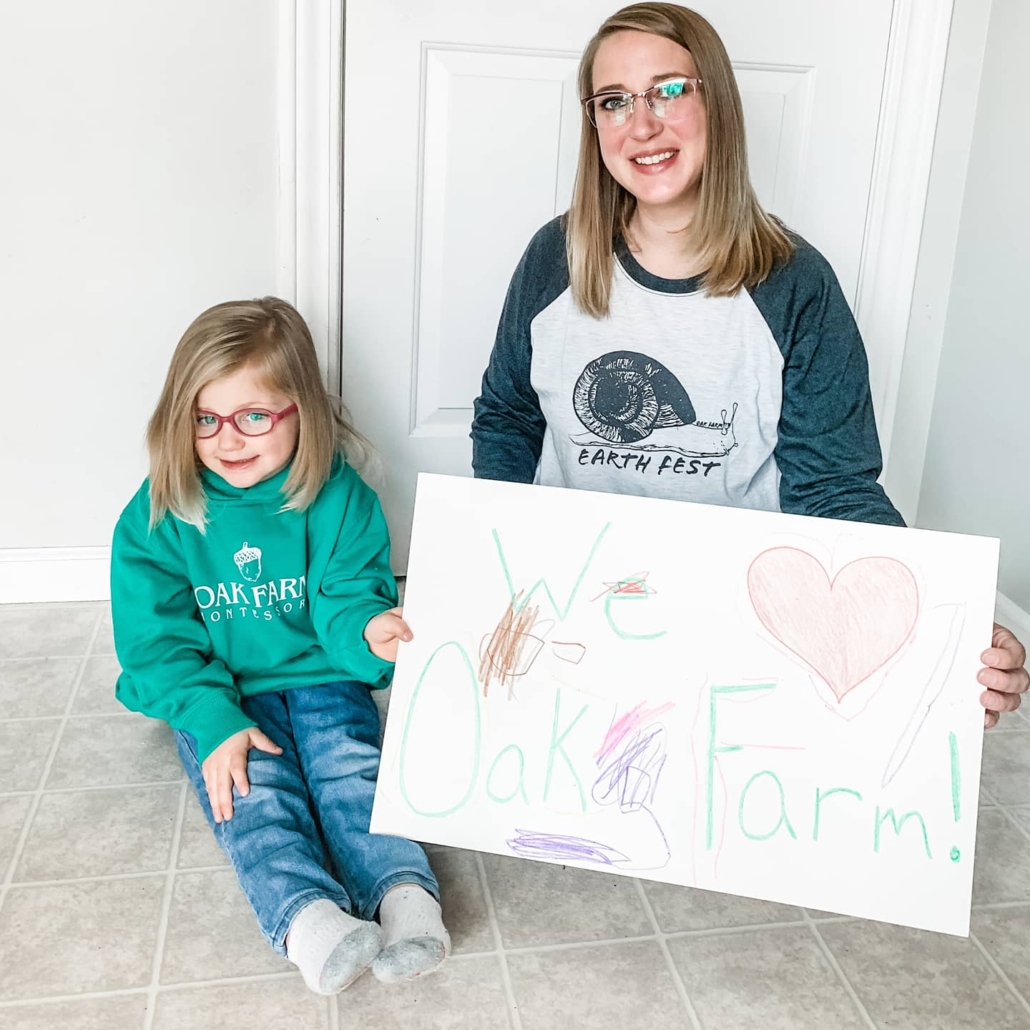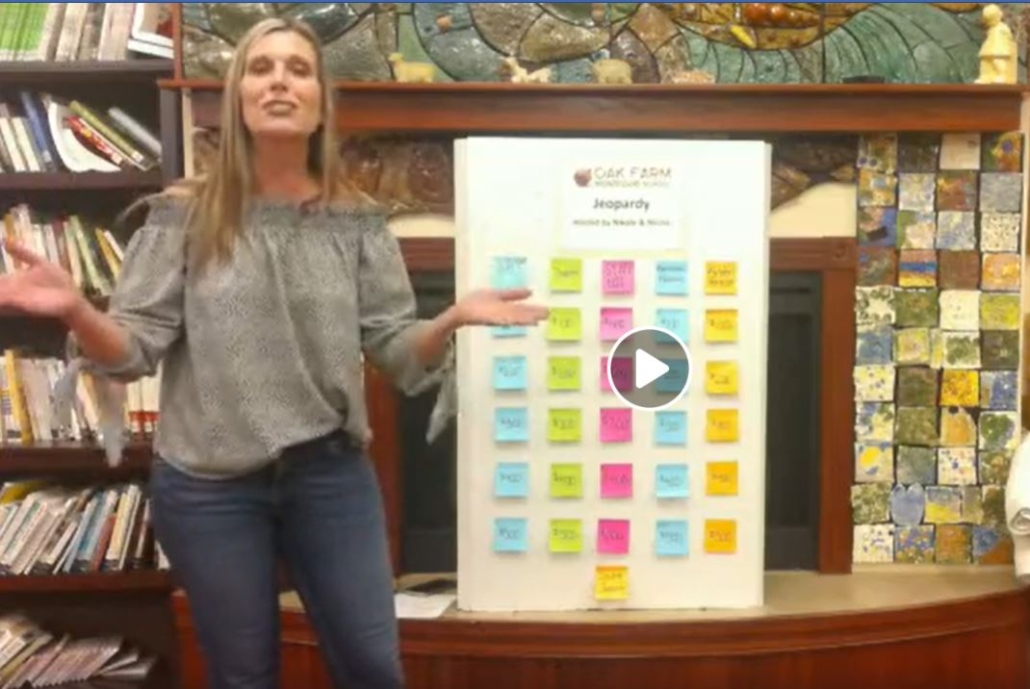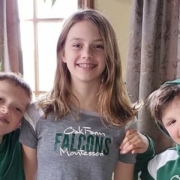Keeping the school community connected
The past several weeks have brought some major changes to our way of life. Many of them have been — and continue to be — challenging. But there are positive things that are happening, too.
In Indiana, schools are closed for the remainder of the year, and the state is presently under a stay-at-home order. And yet, organizations that serve children and young people are being innovative and adapting so that they can continue meeting their needs. We asked Candice Holbrook, head of school at Oak Farm Montessori School, how her staff has adjusted to the changes in how they interact with students and parents, as well as what they’ve learned along the way.
How did the staff work together so that Oak Farm could shift what it was doing and teach students remotely?
Candice: First, I want to share that this really is an evolving process. Everyone is doing the best that they can during this time of disruption. With that being said, we are constantly learning and growing from this experience. Feedback from students, parents, and faculty has been helpful throughout this process so we can reflect on services being provided and make adjustments along the way.
I would like to say that we have been proactive in a lot of ways, however, in unprecedented times such as this, we have had to react and learn from those experiences. What we choose to do with those experiences is up to us, and that has been our approach all along.
First, we had to acknowledge what our reality as a school looked like and then continue to identify what is within our circle of control. We supported one another so that we could personally engage in the situation we all found ourselves in. This teamwork was important to meet the needs of our students and our families. This allowed us to problem-solve barriers and challenges that we might encounter so we could ultimately put a plan into action with our school community.
How did the staff extend the quality learning environments at Oak Farm to their online interactions with students?
Candice: Relationships are so important for learning and even more critical during this time. Without connection and attentiveness to meeting our families where they are at during this pandemic, the likeliness of our children learning and retaining academic content decreases.

Oak Farm is providing an array of opportunities to keep students and parents connected to the school and inspired to continue their learning and follow their interests.
We have focused on building connections with our students and parents so that efforts in providing meaningful distance learning opportunities are accessible and purposeful. As a school, we have provided weekly parent support groups such as Positive Discipline, continued publication of our weekly memo for news and updates, social media activities to stay connected, and a Google school site that puts everything our parents need in one place. Teachers are offering classroom community meeting times, personal opportunities to connect to students one-on-one via FaceTime or Zoom, and games or experiences that build community and keep us connected, such as “Jeopardy,” BINGO, and a camp-out challenge.
As a Montessori school, distance learning has been a huge challenge. In the Montessori classrooms, we believe in the importance of following each individual child in their learning and interests, while also providing choice along the way. It is important for students to learn from, and with, their peers. We have been able to stay true to these beliefs, but the biggest challenge is the prepared environment that our teachers develop to create order for our students.
Since our students are learning from home, our teachers have been creative to provide a sense of order as much as possible during this difficult time. Technology has been a tool to provide lessons, share individualized learning plans, and come together as a community, but learning experiences are so much more than that.
While a traditional lesson might be a worksheet or essay, we look at lessons more organically: outdoor exploration work, cooking for the family, gardening preparation work, sewing masks for your own family or those in need. We truly believe that the world is our classroom and learning can take place anywhere!
How are you still accomplishing your mission in this time of change?
Candice: We are committed to our mission of providing a Montessori environment that inspires children to reach their potential through meaningful work even during this time of distance learning. We also believe that we are accomplishing that goal! However, this looks very different for each of our families, as we serve infants through high school students.
As mentioned previously, it is the prepared environment that is the biggest challenge, but disruption calls for innovation, and that is exactly what we are doing. For example, our infant and toddler teachers have been preparing at-home learning kits that they deliver to their students. They are increasing parent support during this time to help our parents prepare an environment their child can thrive in that also works for their family.
Our elementary students are still continuing their Kids Investigate Natural Disasters (KIND) work, which involves research, persuasive writing, public speaking, and debate to be shared with an authentic audience.
Our secondary students have shared that, while they deeply miss the face-to-face social interactions, they feel their learning has continued on as normal as possible. These young adults are used to having independence and ownership in their learning, so a change to their physical location does not affect their ability to pursue their passions.
What are some of the things your staff is doing to make this situation successful for themselves and for young people?
Candice: In full disclosure, I think this is an ongoing process. We are constantly trying to find that balance of working remotely, supporting our families and students, while also trying to be parents ourselves and support our own children. This is downright hard for everyone. In addition to keeping relationships and community at the heart of our work, we are providing grace to one another during this time.
We have created a school version of Maslow’s Hierarchy of Needs based on the principles of Maria Montessori to support families (faculty and students included) during this time. The purpose was to reassure families that we are prepared to meet them wherever they might fall on the hierarchy and that they are doing enough. For example, some of our families may be trying to figure out how to manage the pandemic crisis and the impact it has on their family. They really need to focus on meeting their spiritual and safety needs before they can start engaging in the lessons, and that is OK.
Is there something in particular that’s working for Oak Farm that others may want to try?
Candice: Honestly, I think schools are doing everything they know how to do to serve their school community. According to the New York Times, people need a schedule, a distraction, and a community to remain positive. A focus for us has been keeping our community connected as much as possible.

On its Facebook page, Oak Farm is engaging students and parents with weekly “Jeopardy” games where they learn about the school.
We have a weekly OFMS “Jeopardy” Night that families can participate in and learn more about our school. Some of the topics include Montessori Materials, Staff 101, Classroom Pets, etc. We also have weekly virtual escape rooms, “Then and Now,” “Where’s Oakey?” (our school version of “Where’s Waldo”), and virtual cooking lessons with our school chef Noah.
When the stay-at-home order is lifted, we have other exciting opportunities planned, including a school parade and scavenger hunt on campus. In addition to the individual classroom sessions, we are offering live Zoom sessions in art, music, Spanish, theater, eco-literacy, and science. This is an opportunity for our related arts teachers to connect with the students as well as an opportunity for students to connect with their peers.
What are some of the positive things you’re hearing from students?
Candice: Students feel supported by the teachers and on multiple occasions have expressed gratitude for the strong community we have maintained. They feel that they are equipped with the tools that they need and that learning is individualized to them as much as possible. Based on the way eyes light up on our younger students when they see their friends and teachers during a Zoom meeting, it is evident that they are excited and enjoy the connection.
Now that you’ve been doing this for a while, is there a particular challenge that’s come up that you’re working to solve?
Candice: Feedback is so important during this time, enabling us to make adjustments along the way. For example, we are a school that does not use devices as part of the everyday curriculum for our younger students. This meant that we needed to contact them to ensure that all of our families had access. Similarly, not all of our students had access to a printer, so we needed to come up with a way to get them what they needed to engage in the learning.
Moving forward, the biggest challenge is scenario building during a time of uncertainty. It is not an impossible task, but it is daunting and exhausting to create multiple plans that you hope you never need to implement. However, having a long-term plan puts us in a position to be proactive and better meet the needs of our students and our school community.
Although this situation is not ideal, what are some of the positive things you and your staff have taken from the experience?
Candice: Being a lifelong learner is a characteristic that we value, not only for our students in our Portrait of a Graduate, but also for our faculty. This time of disruption has accelerated learning in many unexpected ways.
From the beginning of this endeavor, over half of our faculty reported that they found themselves being innovative and trying new things. It feels like overnight we had to problem-solve and think critically in order to continue learning to meet the needs of our students and families. With the right mindset, we have been using this as an opportunity while also being mindful of the lessons we are learning along the way.
Our school environment is rooted in principles that have allowed us to be proactive and take action. Together.

